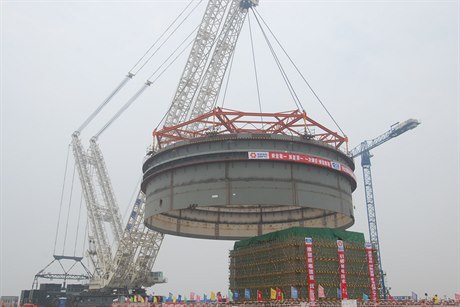Germany and Austria will put pressure on the Czech Republic over its plans to double the size of its current nuclear power plant at Temelín in the wake of Germany’s decision to exit nuclear power, a Czech minister responsible for energy policy has warned.
Speaking on public broadcaster Czech Television on Wednesday night, Deputy Minister of Industry and Trade Tomáš Hüner said he personally expected “some difficulties ” with Germany and Austria with them “either directly or indirectly trying to influence the completion of the third and fourth units of the Temelín plant.”
Austria, which has had a law banning nuclear reactors on Aurtian soil since 1978, has been an outspoken critic of plans to add two new reactor blocks to the current reactor site not far from the Czech-Austrian border in the southwest of the country. Germany has adopted a more critical stance against nuclear power following the accident at Japan’s Fukushima nuclear plant, announcing at the start of this week its decision to close down all nuclear reactors by 2022. Nečas warned that Germany’s nuclear shutdown would lead to a 30 percent rise in Czech electricity prices over the next decade.
Hüner’s comments came fast on the heels of a call by Czech Prime Minister Petr Nečas (Civic Democrats, ODS) during a visit on Wednesday to Dresden for Germany to respect the Czech intention to push ahead with nuclear power. Nečas also warned that Germany’s nuclear shutdown would lead to a 30 percent rise in Czech electricity prices over the next decade and stressed the importance of completing the Temelín plant, which was originally planned to have four reactors but olny two have been built so far.
Hüner underlined that there was no alternative for the Czech Republic to construct more nuclear capacity as available coal reserves are exhausted, adding that the country would probably count on nuclear power for around half of its electricity production by 2030, up from the current proportion of about a third. There was no renewable power source cheaper than traditional power sources, and although natural gas was an option it had to be imported, mostly from Russia, he said.
The winner of the estimated Kč 200 billion Temelín contract should be announced in 2013 with output from the two new Temelín reactors possible from 2021. Three international companies are competing for the deal which would help open up other orders worldwide: France’s Areva, US-based Westinghouse and a consortium of Russia’s Atomstroyexport and Czech nuclear industry supplier Škoda JS.
State-controlled electricity giant ČEZ, the operator of the Czech Republic’s two nuclear plants and organizer of the Temelín expansion tender, has included options for a further three nuclear blocks in the contract. One of these could be build in neighboring Slovakia, where a joint venture with the Slovak state is to launch a feasibility study into the project, with the remaining two likely sited at ČEZ’s nuclear installation at Dukovany in the Vysočina region.




